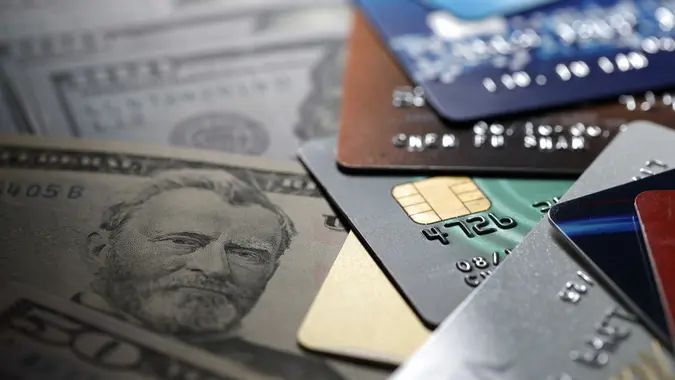Money Expert Seth Godwin: 3 Signs You’re Not a Credit Card Person

Commitment to Our Readers
GOBankingRates' editorial team is committed to bringing you unbiased reviews and information. We use data-driven methodologies to evaluate financial products and services - our reviews and ratings are not influenced by advertisers. You can read more about our editorial guidelines and our products and services review methodology.

20 Years
Helping You Live Richer

Reviewed
by Experts

Trusted by
Millions of Readers
Personal finance influencer Seth Godwin said your financial situation can signify whether credit cards are right for you. Before you can dive into investing in the stock market or real estate, you may need to get back to basics.
Godwin pointed to three signs you’re not a credit card person and why you should pause your use if any of the following apply to you. Even if you don’t use credit cards, these three red flags may indicate your finances need attention.
Red Flag 1: You Don’t Have an Emergency Fund
People without emergency funds must often rely on credit cards to cover unavoidable, unexpected expenses. Godwin said this is a “great way to ruin your finances.” Instead, he advised ditching the cards until you build an emergency fund covering three months of essential expenses.
Many other financial experts recommend having an emergency fund covering three to six months of essential expenses regardless of your credit card habits. However, saving can be difficult if you have to go into debt any time an expense arises that you can’t cover.
If you stop using a credit card for emergency expenses and save your emergency funds in a high-yield savings account instead, you can earn interest rather than accrue it. When financial shocks occur, having this safety net can prevent you from spiraling into a debt cycle.
Red Flag 2: You Carry Balances on Your Credit Cards
Godwin also advised not to use credit cards if you can’t afford to pay your entire statement balance every month.
Spending more than you can afford to pay back is a dangerous spending habit in general, but with interest rates averaging over 20%, you’ll end up spending money on interest that you could have put in savings or other investments. Each month you carry over a credit card balance, you accrue interest, perhaps significantly if you have an average annual percentage rate (APR).
Using a debit card or cash rather than a credit card can allow you to pay off your credit card and stop accruing interest. Plus, the less money you must put toward debt each month, the more you’ll have for savings and other financial goals.
Red Flag 3: You Aren’t Investing
Godwin believes you can’t afford a credit card if you can’t afford to invest, because investing is essential for anyone hoping to retire someday. Regardless of age, if you haven’t retired yet, you should be saving for retirement.
The younger generations have the advantage of time when it comes to saving, which provides two significant benefits. First, compound interest has more time to grow your savings when you start early. Second, you can consistently save smaller amounts over time, making it easier to balance saving with other financial goals and commitments.
Money experts often recommend saving 15% of your pre-tax pay for retirement. However, if you can’t afford 15% right now, start with a smaller, more manageable amount and make saving a habit. Then, try to increase that percentage annually until you reach 15%.
Final Take To GO: Are You a Credit Card Person?
The bottom line is that these red flags could indicate that you’re not a credit card person right now. However, that doesn’t mean you can’t take the steps Godwin recommended to become one, such as establishing an emergency fund or starting your investing journey.
If you start using credit cards again, to avoid charging more than you can pay in full, Godwin has a helpful hint: Pay off charges weekly rather than wait for that monthly statement. A weekly check of your charges may make it easier to spot — and stop — any overspending.
Andrea Norris contributed to the reporting for this article.
 Written by
Written by  Edited by
Edited by 
























